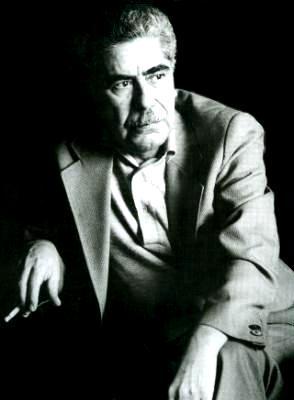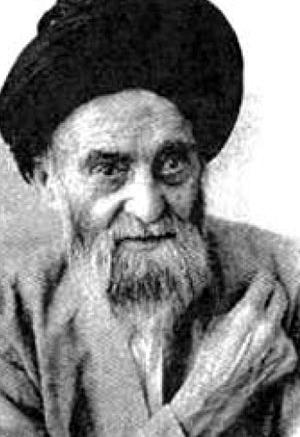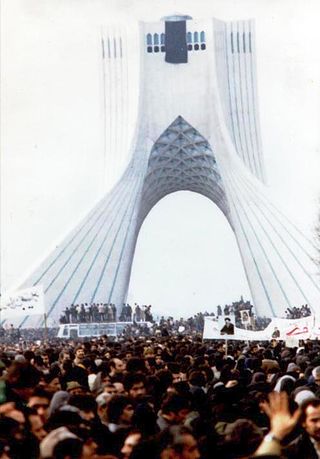Related Research Articles

Ruhollah Khomeini, also known as Ayatollah Khomeini, was an Iranian political and religious leader who served as the first supreme leader of Iran from 1979 until his death in 1989. He was the founder of the Islamic Republic of Iran and the leader of the 1979 Iranian Revolution, which saw the overthrow of Shah Mohammad Reza Pahlavi and the end of the Persian monarchy. Following the revolution, Khomeini became the country's first supreme leader, a position created in the constitution of the Islamic Republic as the highest-ranking political and religious authority of the nation, which he held until his death. Most of his period in power was taken up by the Iran–Iraq War of 1980–1988. He was succeeded by Ali Khamenei on 4 June 1989.

Bonyads are charitable trusts in Iran that play a major role in Iran's non-petroleum economy, controlling an estimated 20% of Iran's GDP, and channeling revenues to groups supporting the Islamic Republic. Exempt from taxes, they have been called "bloated," and "a major weakness of Iran's economy." They have also been criticized for reaping "huge subsidies from government," while siphoning off production to the lucrative black market and providing limited and inadequate charity to the poor.

Mohammed Sadeq Givi Khalkhali was an Iranian Shia cleric who is said to have "brought to his job as Chief Justice of the revolutionary courts a relish for summary execution" that earned him a reputation as Iran's "hanging judge". A farmer's son from Iranian Azeri origins was born in Givi, Azerbaijani S.S.R., U.S.S.R.. He is also reported to have born in Kivi, Khalkhal, in the Khalkhal County, Iran. Khalkhali has been described as "a small, rotund man with a pointed beard, kindly smile, and a high-pitched giggle" by The Daily Telegraph.

The Reformists are a political faction in Iran. Iran's "reform era" is sometimes said to have lasted from 1997 to 2005—the length of President Mohammad Khatami's two terms in office. The Council for Coordinating the Reforms Front is the main umbrella organization and coalition within the movement; however, there are reformist groups not aligned with the council, such as the Reformists Front.

The Alliance of Builders or Developers of Islamic Iran, usually shortened to Abadgaran, was an Iranian conservative political federation of parties and organizations. Described as "Iran's neocons", main groups within the alliance were Front of Followers of the Line of the Imam and the Leader members and Society of Devotees of the Islamic Revolution.

Mostafa Moeen is an Iranian politician, professor of pediatrics, and a human rights activist who is currently founder and president of the Front for Human Rights and Democracy in Iran. He was a presidential candidate for the 2005 Iranian presidential election. His campaign enjoyed the support of some reformist parties and organizations, headed by the Islamic Iran Participation Front (IIPF).

Ali-Akbar Sa'idi Sirjane was an Iranian writer, poet and journalist who died in prison under mysterious circumstances after having been arrested for openly criticizing the government. He is widely believed to have been killed at the hands of the Islamic Republic intelligence ministry for criticizing of Iran's Supreme Leader.

The Office for Strengthening Unity, is an Iranian student organization created in 1979, and has been described as "the country's most well-known student organization," and "Iran's leading prodemocracy student group". Founded in 1979 as a conservative Islamist organization to combat leftist, more secular, student groups, the OSU has evolved to support democracy and reform in Iran and thus is now in opposition to the political heirs of its founders.

Ayatollah Taqi Mesbah, commonly known as Mohammad-Taqi Mesbah-Yazdi was an Iranian Shi'i cleric, philosopher and conservative political theorist who served as the spiritual leader of the Front of Islamic Revolution Stability.
Anjoman-e Hojjatieh, also called The Hojjatie Society, is a traditionalist Iranian Shi'i lay religious organization. It was founded by Mashhad-based cleric Mahmoud Halabi in the 1950s to counter missionaries of Bahaism, "who claimed that the long-awaited Twelfth Imam of Shi'ite Islam had returned", and that Shia Islam was now superseded by the Baháʼí Faith. Along with training "cadres for the 'scientific defense'" of Shiʿi Islam against the Baháʼí, the group promotes religious orthodoxy through evangelism, works to hasten the return of the Mahdi. Its socio-economic roots are in the bazaar and the traditional middle class of Iran, and has been called "semi-clandestine".

The Basij, Niru-ye Moghāvemat-e Basij, full name Sâzmân-e Basij-e Mostaz'afin, is one of the five forces of the Islamic Revolutionary Guard Corps (IRGC). The force is named Basij; an individual member is called basiji in the Persian language. As of July 2019, Gholamreza Soleimani is the commander of the Basij.

Islamic Government, also known as The Jurist's Guardianship: Islamic Government, (Persian: حکومت اسلامی ولایت فقیه, Velayat-e faqih: Hokumat-i Eslami) is a book by the Iranian Shi'i Muslim cleric/jurist, and revolutionary, Ayatollah Ruhollah Khomeini. First published in 1970, it is perhaps the most influential document written in modern times in support of theocratic rule.

Fadā'iyān-e Islam is a Shia fundamentalist group in Iran with a strong activist political and allegedly terrorist, orientation. The group was founded in 1946, and registered as a political party in 1989. It was founded by a theology student nicknamed Navvab Safavi. Safavi sought to purify Islam in Iran by ridding it of 'corrupting individuals' by means of carefully planned assassinations of certain leading intellectual and political figures. The group executed a series of successful killings and attempted killings and succeeded in freeing of some of its assassins from punishment with the help of the group's powerful clerical supporters. But eventually the group was suppressed and Safavi executed by the Iranian government in the mid-1950s. The group survived as supporters of the Ayatollah Khomeini and the Iranian Revolution.

Mohammad Baqer Majlesi, known as Allamah Majlesi or Majlesi Al-Thani, was an influential Iranian Twelver Shia scholar and thinker during the Safavid era. He has been described as "one of the most powerful and influential Shi'a ulema of all time", whose "policies and actions reoriented Twelver Shia'ism in the direction that it was to develop from his day on."

One of the most dramatic changes in government in Iran's history was seen with the 1979 Iranian Revolution where Shah Mohammad Reza Pahlavi was overthrown and replaced by Ayatollah Ruhollah Khomeini. The authoritarian monarchy was replaced by a long-lasting Shiite Islamic totalitarian Islamic republic based on the principle of rule by Islamic jurists,, where Shiite jurists serve as head of state and in many powerful governmental roles. A pro-Western, pro-American foreign policy was exchanged for one of "neither east nor west", said to rest on the three "pillars" of mandatory veil (hijab) for women, and opposition to the United States and Israel. A rapidly modernizing capitalist economy was replaced by a populist and Islamic economy and culture.
Hezbollah is an Iranian movement formed at the time of the Iranian Revolution to assist the Ayatollah Ruhollah Khomeini and his forces in consolidating power. References in the media or writing are usually made to members of the group—or Hezbollahi—rather than Hezbollah, as Hezbollah is/was not a tightly structured independent organisation, but more a movement of loosely bound groups, usually centered on a mosque.

Ayatollah Seyed Reza Zanjani was a Shia Iranian cleric who opposed first the autocracy of Shah Mohammad Reza Pahlavi and then theocracy that was established by Ayatollah Ruhollah Khomeini and his supporters following the Islamic Revolution.

Many organizations, parties and guerrilla groups were involved in the Iranian Revolution. Some were part of Ayatollah Khomeini's network and supported the theocratic Islamic Republic movement, while others did not and were suppressed when Khomeini took power. Some groups were created after the fall of the Pahlavi Dynasty and still survive; others helped overthrow the Shah but no longer exist.

Iranian monarchism is the advocacy of restoring the monarchy in Iran, which was abolished after the 1979 Revolution.

Afshin Molavi is an Iranian-American author and expert on global geo-political risk and geo-economics, particularly the Middle East and Asia. He is co-director of the Emerge85 Lab, a joint research initiative between the Johns Hopkins Foreign Policy Institute and UAE-based Delma Institute. He is a senior research fellow at both the New America Foundation and Johns Hopkins University Paul H. Nitze School of Advanced International Studies, as well as a senior advisor at Oxford Analytica. At New America, he is co-director of the World Economy Roundtable, an exercise to re-map the global economy in the wake of The Great Recession.
References
- ↑ Molavi, Afshin The Soul of Iran, Norton, (2005), p.97-99